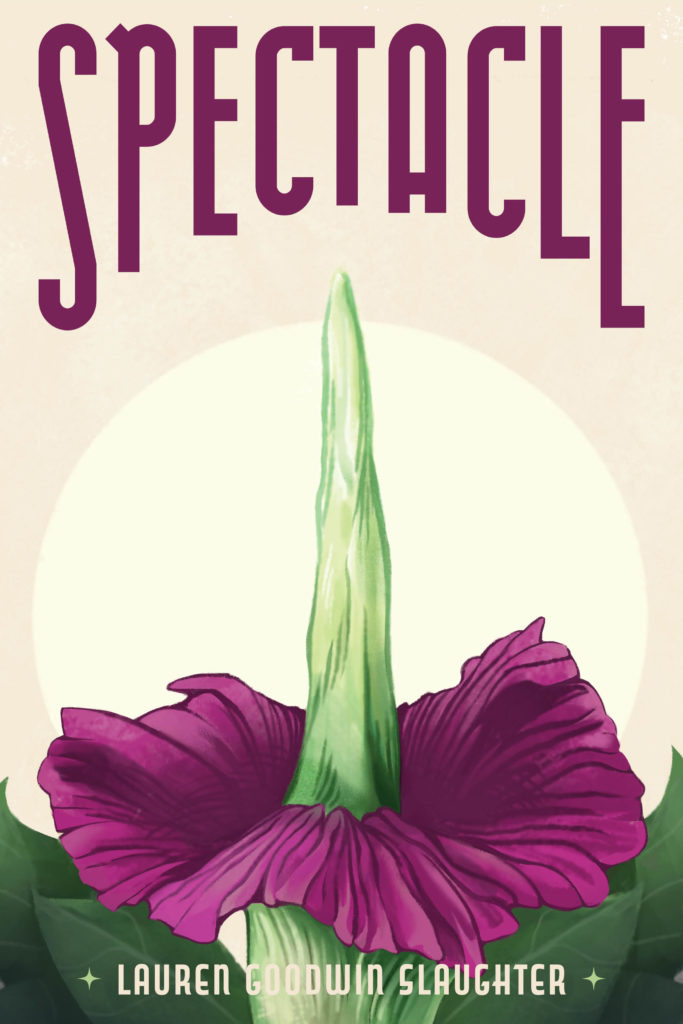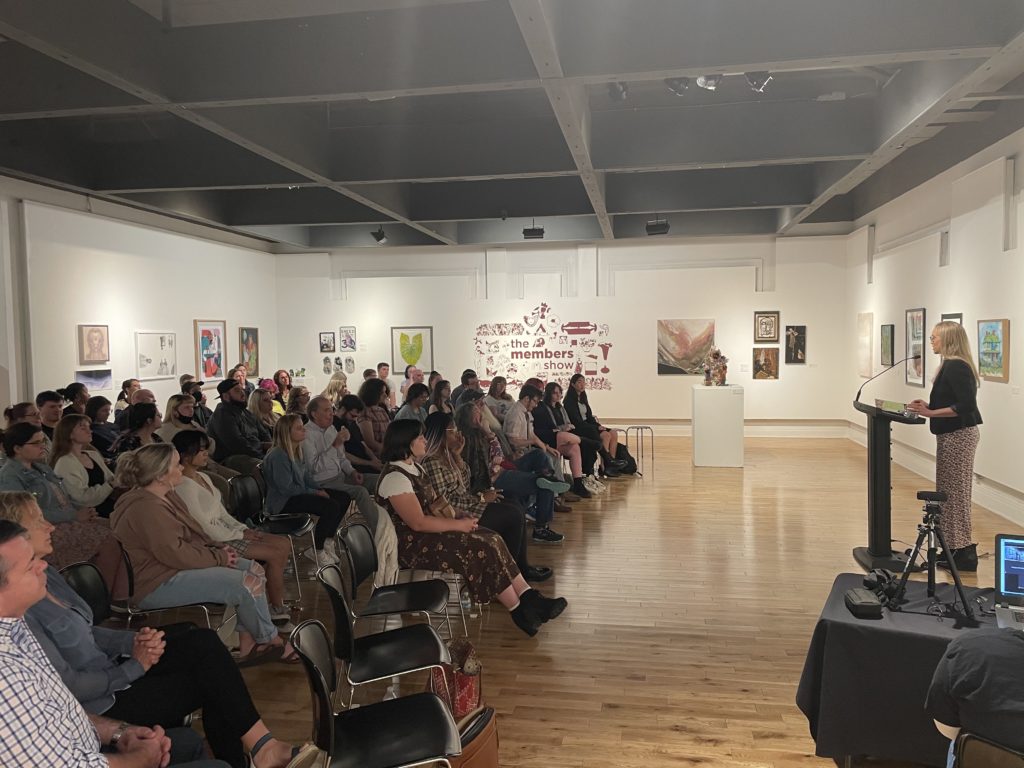
Reviews

As Eudora Welty says, you will read Spectacle quickly at first with “a sweet devouring” but then you will want to read it again. The poems will comfort but also push you, repeatedly, and in a good way, out of your comfort zones.
—Virginia Bell
Spectacle starts with the eye—the dead moth’s eyespot, the photographer’s eye behind the lens, the anxious eye of the mother watching through a door, who tries, impossibly, to translate the “ghost forest” of grief through which her children must move. But what’s so powerful about Lauren Slaughter’s poems is how the lens widens: “the throb of knowing, always, / what comes next—” poetry’s urgent power to improve our collective vision, to help us see the larger, fraught family of our humanity and its shared losses. Knowing deeply the invisibility that comes with motherhood, womanhood, and otherhood of many kinds, Slaughter refuses to let the edges of her poems’ sight blur, and, in the space beyond ekphrasis, where real life is captured, she “reach[es] / for some / right word.” I, as her ardent reader, am better for it.
— Jenny Molberg, author of Refusal
Threaded throughout this stunning collection are ekphrastic poems responding to Rineke Dijkstra’s photographs. And like Dijkstra, Lauren Slaughter is concerned with what appearances try to conceal—the complicated emotions that lurk around everyday activities from celebrating an aging parent’s birthday to navigating a store’s clothing rack. Moving seamlessly between moments of quiet joy and sudden heartache, these finely chiseled poems rise from the page to provide comfort with their vulnerability, lyrical surprise, and wisdom. If there was ever a book that spoke to this era, it is this one.
—Charlotte Pence, author of Code
The editors of Panhandler Magazine and Panhandler Books are thrilled to announce that Panhandler Books will publish Lauren Goodwin Slaughter’s poetry collection, Spectacle, in Spring 2022! In anticipation of the book’s publication, Lauren sat down with Ashley Hernandez to discuss the collection and Lauren’s writing process.
INTERVIEW
January 13, 2021
Ashlea Hernandez: Lauren, I wanted to ask you first: what excites you the most about Spectacle?
Lauren Slaughter: Wow, what a great question. Can I say that it’s finished, finally? (laughter). Writing the book was such a long process, and it started someplace totally different with poems that, for the most part, didn’t make the final cut into the final version of the book. But I will say, that for the most part I’m pleased that the book does what I want it to do, if that makes sense. And overall, I feel like I was able to engage with topics I may have shied away from in my earlier writing. I was also particularly excited about the Rineke Dijkstra poems. Those were really challenging but fun to write, and I’m really excited that she has agreed to include some of the images. Jon was kind enough to make that connection for me, and I couldn’t be more thrilled that it worked out. To be honest, I’m pretty star struck about it.
AH: That’s exciting.
LS: I can’t wait to see how those work in the collection.
AH: That’s awesome because when Jon mentioned that you were going to be able to have those photographs, as a reader, when I read an ekphrastic poem, then I immediately have to go and find out what it looks like. I have to find the image that pairs with it, and I feel like it’s such a great way to have those poems side by side with the inspirational photograph. And since you mentioned her, tell me about how you first got introduced to her work and how you translated what you saw into poetry?
LS: Sure, I was in New York. I think it was 2012. I went to the Guggenheim, as one does, and they were doing a retrospective of her work. It was my first time encountering her photographs, and I just was gobsmacked. They were so arresting and powerful and seemed to capture individual people so specifically, especially their vulnerability. I just couldn’t get enough. And so I started writing about her work. I think the first one that really struck me was Dijkstra’s self-portrait — there she is, center frame, red-eyed and exhausted from swimming. I started to explore her biography and learned more about the inspiration behind her work and the story behind that photograph in particular. Some of the others, too — seeing those images in the gallery and having that really visceral, immediate experience and connection, and then to step away and delve into a bit of research about her work and life. She’s such a fascinating person and artist and I had to go deeper.
AH: You can, totally. I can tell that it was just one of those moments where you know inspiration just came and you had to write about this. I love that part. I think my favorite one was Julie. I think my favorite line of that poem was when she just smashed the thing to her breath, because, as a mom, I could total I felt like it was one of those moments where you just, I don’t know, like the first time you hold your child and you’re not really sure how to do it, and I felt like those two images and the poem together encapsulated that feeling.
EXCERPT
ALICE THE CORPSE FLOWER BLOOMS AT THE CHICAGO BOTANIC GARDEN
— In September, 2015, thousands gathered to see Alice the Amporophallus, one of the Chicago Botanic Garden’s “corpse flowers,” named for their rancid stench, when she unexpectedly bloomed.
And what woman
hasn’t been thus
gathered round,
a mob of cell phones
raised like torches
poised to snag the spectacle
that is her efflorescence—
pompons peeping out
(glimpse of thigh
or thong)
ovules swollen
with her fertile redolence?
Because smell is indifferent
to video or maybe more
the dare you take
to taste the sour milk
a queue of tourists forms
to step right up to Alice’s enormous
sex and nozzle in—
whole heads will disappear
in a cunnilingual pantomime
the wincing faces say
reeks of rotting flesh,
or fish, or death.
~
We use real words
at our house, not prim
approximations, not
the birdie of my childhood,
or girly bits, or vee-vee,
or hoo-hoo, or kitten,
yet despite my professorial directives
my young daughter
refers only to her private—
that is private
in the singular, like signage
on her bedroom door
years from now, and as if
understanding, somehow,
she must enlist
a part of herself always
to serve as her own soldier,
her very own private,
her protector,
and I won’t correct her.